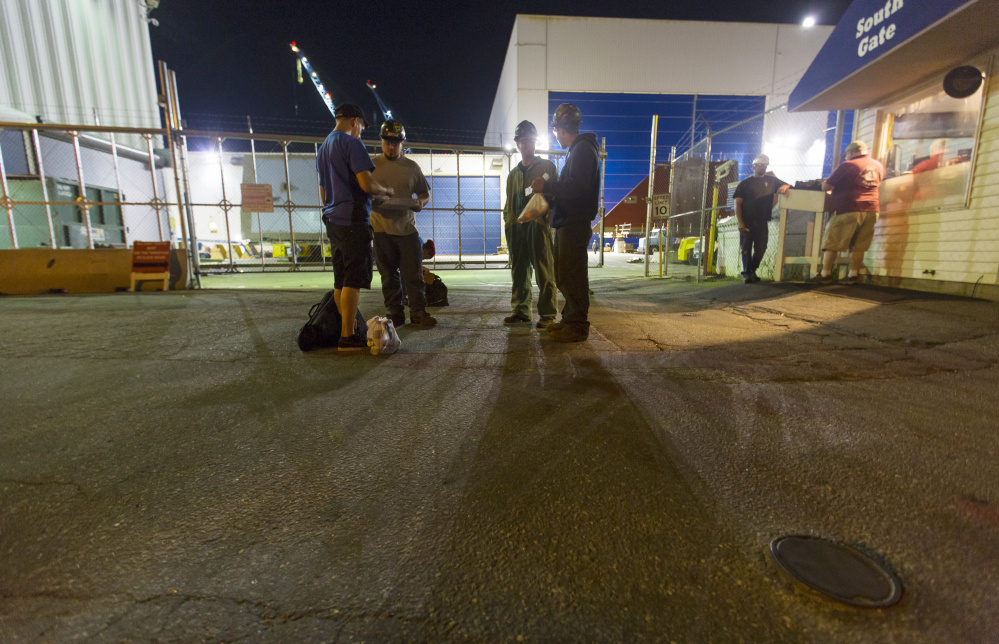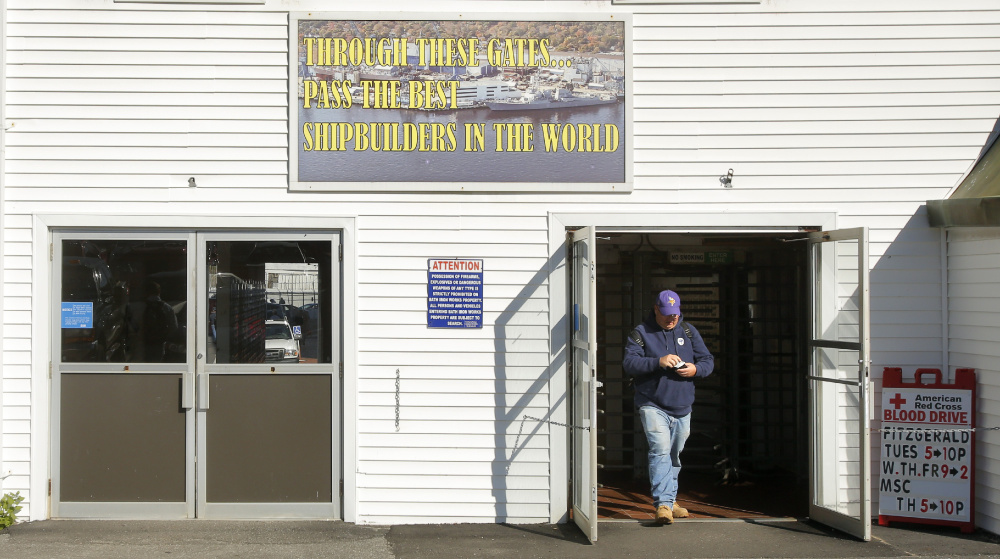Rumors about possible layoffs were already brewing during Friday shifts at Bath Iron Works as Thursday’s news of the loss of a U.S. Coast Guard cutter contract filtered through the workforce.
Some workers said that management went on a hiring spree last September and spent big to make much-needed updates to the facility in anticipation of winning the Coast Guard work.
The company, Maine’s fourth-largest employer with more than 6,000 employees and a payroll of $360 million as of 2014, does $64 million worth of business with 345 companies in nearly every county in the state.
Will Beckwith, 28, a painter at the shipyard for five years, said he believes the winning bidder, Eastern Shipbuilding Group in Panama City, Florida, under-bid the work.
He said some portion of the cutter contract could come to Bath anyway if Eastern runs into problems.
“There’s ships out here, probably a couple ships that were sent up here to get finished,” Beckwith said. “There’s a lot of people who are worried, but I got hope.”
Mari Eosco, chairwoman of the Bath City Council, called the news “very disappointing.”
“Everyone has had their fingers crossed for this contract,” she said. Eosco grew up in Bath and said the shipyard historically has seen its workforce numbers ebb and flow.
“We’ve always been feast or famine waiting for contracts to come in,” she said. “Hopefully, this is just one of those dips.”
Eosco said that although the potential job losses are significant, many BIW workers live in cities or towns outside of Bath, spreading out the anticipated unemployment.
SENIORITY IS THE KEY
Rank-and-file BIW employees seemed to fall into two camps of thought: Those whose years of seniority are seen as enough to keep them safe from a potential layoff – and everyone else.
Kyle Green, 33, is a recent graduate of the University of Southern Maine’s mechanical engineering program, and helps design heating, ventilation and air conditioning systems at BIW.
Green said he was only hired in October of last year, but feels secure in his position as a planner, and said there is work already in process that will carry him for another 18 months to two years. Beyond that, he is less certain, and suspects the lower-level positions, such as painters, fitters and welders, are more susceptible to the ups and downs of the business.
“I’ve had a few people say, ‘Hey it was nice knowing you,’ but I’m not sure if they were referring to me or themselves,” Green said. “I think we’ve got work for a couple years, but there’s nothing really after that in terms of hard contracts.”
Steve Brzezowski, 30, wasn’t sure which camp he’d fall into. With two and a half years at the yard, the threat of losing his job came down hard this morning.
“I felt it coming through the gate,” he said. “I think for a lot of us young guys, we want that chance that the older guys had, to have a job and work 30 years and have a chance at retirement.”
His job as a painter at BIW has treated him well, and the benefits are hard to beat, he said.
“It’s disappointing, because we’re working hard, especially with what we sent down the river,” he said, referring to the recent launch of the Zumwalt class destroyer that is on its way from Maine to Baltimore to be commissioned in the coming weeks.
He and others said they have not heard yet from the company or their union representatives about the next steps. Many of them first heard of the contract decision through media reports Thursday night. Others said morale already had been low, after workers ratified a contract last October that held off raises for four years, among other concessions.
Rich Nolan, president of Local S6 of the Industrial Union of Marine and Shipbuilding Workers of America, the largest union at the shipyard, said that despite the fear of layoffs, he does not foresee any major movement for another year or two, around the time BIW would have begun work on the Coast Guard contract, had it won. He said the more immediate impact may be felt by planners and salaried staff, and not the roughly 3,400 employees his union represents.
Nolan estimated about 1,200 people have been hired in the last year or two, and said while the loss of the cutter contract stings, it will not be the only factor determining the size of BIW’s future workforce. Roughly 1,000 workers currently have more than 30 years with the company, so attrition will play into management’s decision.
Also up in the air is whether the company will win contracts for more Arleigh Burke-class destroyers, seen as BIW’s bread and butter, but it will be another year before that bid process wraps up, Nolan said.
Nolan also cast doubt on the ability of Eastern, the winner of the cutter contract, to deliver on budget, with little past experience building that type of vessel, and said the facility appears to lack the same capabilities as BIW.
He said he has been in close contact with the state’s congressional delegation regarding the bid process, and is trying to determine whether BIW could see another opportunity to scoop up the Coast Guard work if Eastern’s first ship is over budget, delivered late or not up to standards. Nolan said BIW could protest the current award decision, but said that option typically has little chance of reversing the Coast Guard’s decision.
“Whether or not BIW does that, we’ll know in a couple weeks,” he said. “It used to be that the government paid a little extra for a Bath-built ship. Now, if it hits the benchmarks, low bid wins.”
State Sen. Linda Baker, R-Bath, said she was disappointed to learn of the lost bid, and is hoping to see an examination of the factors that led to it. Baker was among a group of officials who toured the shipyard in June and heard about preparation s for the Coast Guard work from BIW President Fred Harris.
“I know a great deal of work had been put into (the bid) and we had high, high hopes,” Baker said. “It’s certainly a big economic hit to the area, especially after some of the concessions the unions made.”
At the Southgate Family Restaurant, where BIW workers typically pack the dining room for breakfast and lunch, manager Karl Shaumburg said news of the loss of the contract was just trickling in.
Shaumburg estimated BIW employees account for 30 percent to 40 percent of the roughly 200 meals the restaurant serves each day, and so far it is too early to tell how that will affect the restaurant’s bottom line. Luckily, there is a stable flow of families and non-BIW customers to buoy the business.
“For us, it’s a waiting game,” he said.
After the 3:30 p.m. whistle, among the rush of workers was Andy Beale, a machinist with less than three years at BIW. Beale, too, said he is now hoping for more destroyer contracts.
“I’ve got three kids, a mortgage and bills to pay,” said Beale, 41. “I drive an hour from Palermo to get here. It’s not an easy trade. We’ll just keep plugging away and hope for the best.”
Send questions/comments to the editors.












Comments are no longer available on this story